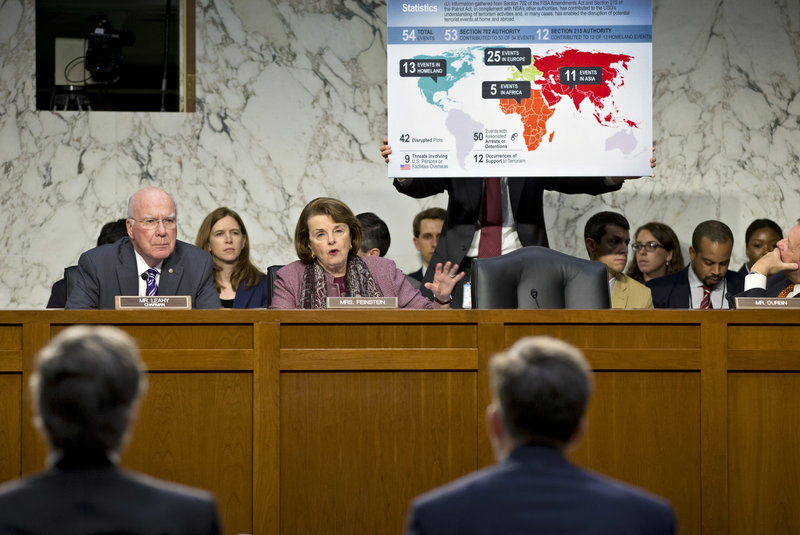President Obama’s national security team acknowledged for the first time Wednesday that, when investigating one suspected terrorist, it can read and store the phone records of millions of Americans.
Since it was revealed recently that the National Security Agency puts the phone records of every American into a database, the Obama administration has assured the nation that such records are rarely searched and, when they are, officials target only suspected international terrorists.
Meanwhile, at a hacker convention in Las Vegas on Wednesday, the head of the NSA said government methods used to collect telephone and email data helped foil 54 terror plots – a figure that drew open skepticism from lawmakers back in Washington. “Not by any stretch can you get 54 terrorist plots,” said the chairman of the Senate Judiciary Committee, Sen. Patrick Leahy, D-Vt.
More than a decade after the terror attacks of 2001, the phone-record surveillance program has stirred deep privacy concerns on Capitol Hill, where Leahy said Wednesday during an oversight hearing: “If this program is not effective, it has to end.”
NSA ‘HAS A PROBLEM‘
In the House earlier this month, lawmakers said they never intended to allow the NSA to build a database of every phone call in America, and they threatened to curtail the government’s surveillance authority. “You’ve got a problem,” Rep. James Sensenbrenner, R-Wis., told top intelligence officials weeks ago.
Sensing a looming shift in the privacy-versus-security cultural calculus, the White House responded: It has ordered the director of national intelligence to recommend changes that could be made to the phone-surveillance program, and President Obama invited a bipartisan group of lawmakers to the White House on Thursday to discuss their concerns about the National Security Agency’s surveillance programs.
The administration has emphasized its concern for privacy and what it describes as oversight of its activities by the secretive Foreign Intelligence Surveillance Court, by congressional committees and by internal auditors. It has said, for example, that under rules approved by the court, only 22 people at NSA were allowed to approve searches of the phone database, and only seven positions at NSA, a total of 11 people, were authorized to disclose any results believed to be associated with persons in the United States.
But testimony before Congress on Wednesday showed how easy it is for Americans with no connection to terrorism to unwittingly have their calling patterns analyzed by the government. Records of millions of Americans can be swept up in the investigation of one terrorist.
NSA TRIES TO REASSURE
NSA officials attempted to assure members of Congress that privacy issues were being addressed. Such reassurances, however, have done little to quell the sharp criticism from both parties over the once-secret program. Last week saw a close vote in the House on a measure that aimed to kill the phone surveillance program.
On Wednesday, the administration acknowledged some limitations to its sweeping surveillance powers are inevitable.
“We are open to re-evaluating this program in ways that can perhaps provide greater confidence and public trust that this is in fact a program that achieves both privacy protections and national security,” Robert Litt, counsel to the Office of the Director of National Intelligence, told skeptical members of the Senate Judiciary Committee.
This newest privacy-vs.-security debate was touched off when former government contract systems analyst Edward Snowden leaked classified documents exposing NSA programs that store years of phone records on every American. That revelation prompted the most significant reconsideration yet of the vast surveillance powers Congress granted the president after the Sept. 11, 2001, attacks.
The administration intended to keep the telephone program a secret, and for more than a decade few in Congress showed any interest in limiting the surveillance. Snowden’s leaks abruptly changed the calculus on Capitol Hill.
The telephone program is authorized under a provision of the USA Patriot Act, which Congress hurriedly passed after 9/11. President George W. Bush’s administration said then what Obama’s administration says now: that in order to connect the dots, it needs to collect lots of dots.
Copy the Story Link
Send questions/comments to the editors.



Success. Please wait for the page to reload. If the page does not reload within 5 seconds, please refresh the page.
Enter your email and password to access comments.
Hi, to comment on stories you must . This profile is in addition to your subscription and website login.
Already have a commenting profile? .
Invalid username/password.
Please check your email to confirm and complete your registration.
Only subscribers are eligible to post comments. Please subscribe or login first for digital access. Here’s why.
Use the form below to reset your password. When you've submitted your account email, we will send an email with a reset code.